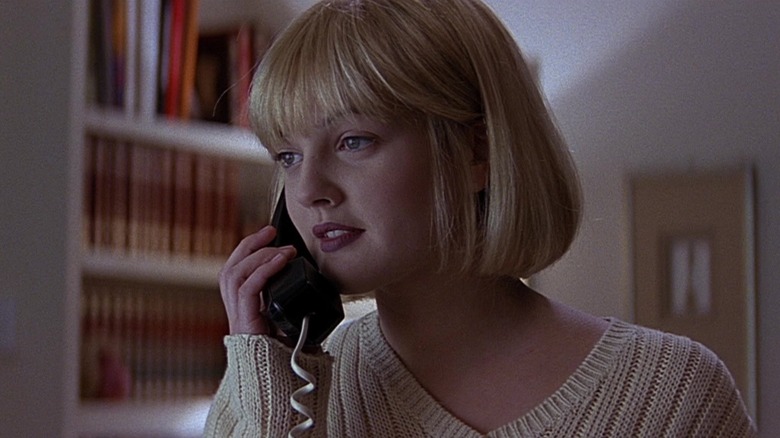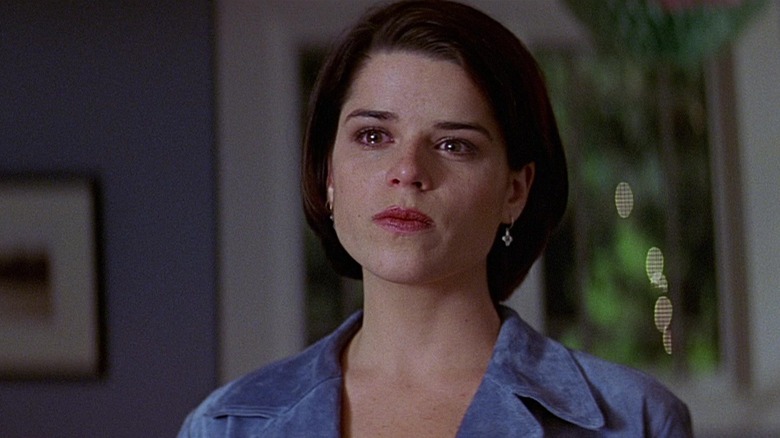Why The Best Scream Movie Doesn't Have The Franchise's Highest Rotten Tomatoes Score
If you made someone guess which "Scream" film has the best rating on Rotten Tomatoes, most people would pick the first one. That's the only "Scream" movie that seemingly everyone loves, whereas most people have some bones to pick with each of the sequels. And yet, "Scream" only has a score of 78% fresh. It's outdone by "Scream 2," which has an 83%. Even stranger is that the fifth and sixth "Scream" films land at 76% and 77%, respectively. They have lower scores than Wes Craven's original, yes, but the margin is slim.
To those unfamiliar with Rotten Tomatoes, this data seems to clash hard with the general consensus on the quality of these films. Most agree that the 2020s "Scream" sequels, while fun, still don't hold a candle to Craven's original. So, what gives? How did the divisive "Scream VI" pull off a score only 1% lower than the first movie?
The easiest answer is that people are misunderstanding how these RT scores work. A 78% rating is not the equivalent of a 7.8/10 rating on IMDb, because reviews on RT are sorted into two categories: positive ("fresh") or negative ("rotten"). So, if all the included critics give a movie a 7 out of 10 rating, it'd have a 100% score on the website, which would rank it higher than a movie that received more praise overall but had a few "rotten" reviews thrown into the mix.
You can see this on display with Craven's "Scream" and "Scream" (2022). The positive reviews for the former are gushing about how it reinvigorated the slasher genre, while the positive reviews for the latter say it captured some of the vibes of the first film. Both are positive sentiments, but one is clearly more positive than the other.
In certain respects, the Scream sequels have less to prove
Original movies tend to have a lot of expectations thrown on them. Every beloved classic film you know today was once a new movie trying something different than what audiences were expecting, and "different" rarely gets universal acclaim on day one. In the case of "Scream," it was taking a surprisingly funny, meta approach to its horror. It's a film where the characters are seemingly aware (at least to some extent) that they're in a movie, which leads to a clash of tones that might be jarring on first watch. It felt like "Scream" was breaking the rules of what a horror movie was supposed to be.
Even beyond the meta aspect, the original "Scream" suffered from everyone wanting different things from a horror movie. Some people want their horror films to be fun scary, while others want their horror movies to be traumatic scary. "Scream" leans more towards the former, to the disappointment of those looking for the latter. Viewers often struggle to judge a scary movie for the type of scary it's trying to be, rather than the type of scary they personally prefer.
This is one of the benefits sequels have when it comes to reviews, be they from critics or regular viewers: Most of the people who don't like the first movie simply don't stick around to watch the second one, and they're not leaving their reviews for films they haven't seen. (Well, unless the movie's already gotten caught up in the culture war, but that's an issue for a separate article.) As the "Scream" franchise went on, the audience watching it became increasingly made up of long-time "Scream" fans, as opposed to the general audience that turned out to see the first movie.
Much like the Scream franchise, Rotten Tomatoes has gotten softer over time
In 2023, Vulture published an article detailing the various methods a PR firm used to improve multiple movies' Rotten Tomatoes scores. That included intentionally providing screener access only to critics who were expected to write a positive review. The firm even outright asked a handful of critics to change their scores from negative to positive.
Even ignoring the cases of outright manipulation, it's hard to ignore how RT scores have grown more positive over time. Part of this is due to how RT has widened its pool of verified critics, leading to more of its reviews coming from writers who view movies from a fandom perspective rather than a critic's one. This is why if you change the settings on the Tomatometer from the default "all critics" to the more exclusive "top critics" option, the movie's score tends to decline, especially when it comes to franchise sequels. With "Scream VI," for instance, the moment you switch to "top critics," the score declines 12 points to 65%. Meanwhile, for the much stronger "Scream 2," switching to "top critics" improves the score by 2%.
Another potential, hard-to-prove factor is that critics are concerned about the state of the movie industry and may have lowered (consciously or otherwise) their standards as a result. At a time when the box office is continually receding and we're worried the medium of film might be falling out of relevance, badmouthing a new movie feels a bit meaner than it used to be. It's become rare to see a critical review go viral for how viciously it tears a film apart because, in a time where it seems like a miracle that Hollywood's functioning at all, even a bad movie feels like a gift.


